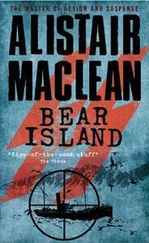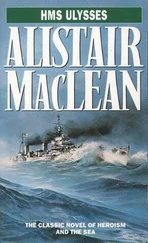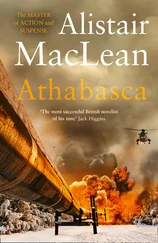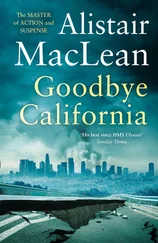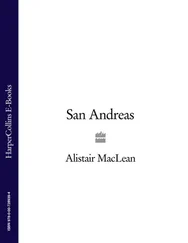It was a fifty yard trip to the south-west tower and he made it in under three minutes. With the rope to walk on and the base of the curved spikes for support it was, for Bruno, a ridiculously easy passage. Once, but then only very briefly, he had to duck low when the searchlight of the watch-tower he was approaching traversed the south wall, but there was never any danger of discovery. And within a minute of his arrival at his destination a third guard had lost all conscious interest in the immediate future.
Bruno pointed his torch down and signalled four times, this to let those waiting below know that he had arrived but to wait. There was still the final guard to be disposed of, the one in the north-west tower. It could well have been that the guards merely traversed their searchlights when and if the whim took them or there could have been some concerted arrangement, however irregular that may have been. In any event, he could not afford to arouse any degree of suspicion. He waited until the remaining guard had made a couple of perfunctory traverses with his searchlight, dropped down to the roof of the research building — like its eastern counterpart it was five feet below the level of the wall — and made his silent way across. Clearly the guard had had no suspicion at all. Bruno made his way back to the south-west watch-tower, flashed his torch twice and lowered his weighted cord again. A minute later he was securing a heavy knotted rope to the base of the spikes. He flashed again, waited a few seconds and gave the rope an experimental tug. It was bar-taut. The first of his companions was on his way up. Bruno peered downwards to try to identify the climber, but the gloom was too deep to make positive identification: from the bulk of the shadowy figure it looked like Kan Dahn.
Bruno embarked on a more careful examination of the roof. There had to be an access hatch for the watch-tower guards, for there was no such vertical access in or near the towers themselves. He located it almost at once by a glow of light emanating from a partially covered hatchway close to the inner edge of the roof, about halfway between the north and south walls. The hatchway cover, vertically sided, curved through an arc of ninety degrees, whether to obscure the light from above, which seemed unlikely, or to give protection against the weather to the hatch below, which seemed more probable. Bruno hitched a cautious eye round the corner of the cover. The light came from a heavily meshed square of plate glass set in a hinged trap-door. Looking down, Bruno could see only a part of the bleak room below but what he could see was enough. There were four guards there, fully clothed, three of them lying, apparently asleep, on hinged canvas bunks, the fourth, his back to Bruno and facing an open door, playing some sort of solitary card game. A vertical steel ladder ran from the floor of the room to the side of the trapdoor. Gingerly, Bruno tried the hatch, but it was locked, probably bolted from below. The place might not, as Harper had said it was, be guarded like Fort Knox, but they certainly took every precaution against the most unlikely occurrences. Bruno moved away and looked down over a low parapet into the courtyard. There were no immediate signs of the guard dogs Harper had mentioned, but that did not preclude the possibility of their lurking in one of several archways he could see, but that didn’t seem likely: Dobermanns are inveterate prowlers. And there was no movement or sign of life in the glass-enclosed elevated passageway that joined the two buildings on the fifth floor level.
When Bruno returned to the south-west tower Kan Dahn was already there. The ninety-foot climb hadn’t even altered his rate of breathing. He said: “How was the trip across?” “A good performer always quits at the top. I can’t ever top that, so I’ve just quit.”
“And not a soul to see you. Alas, life’s little ironies. I mean, with an audience there, we could have cleaned up twenty thousand bucks tonight.” He appeared in no way surprised by Bruno’s decision. “The watch-tower guards?” “Asleep.”
“All?” Bruno nodded. “So there’s no rush?” “There’s no time to hang around either. I don’t know when the reliefs come on duty.”
“7 p.m. seems an unlikely hour.”
“Yes. But we haven’t come all this way to take what looks even like a ghost of a chance.” He turned as first Roebuck and then Manuelo appeared in rapid succession. In contrast with Kan Dahn they appeared to be experiencing some difficulty with their breathing. Roebuck, the double canvas bag still slung over a shoulder, said: “Thank God we go down that rope instead of up when we leave.”
“We don’t leave that way.”
“We don’t?” Roebuck paled beneath the tan. “You mean there’s another way? I’m not sure if I’m looking forward to that.”
Bruno said soothingly. “A Sunday walk, that’s all. Now, access. There’s only one way in from the roof and that’s locked.”
Kan Dahn said: “A door?”
“A trap-door.”
Kan Dahn brandished his crowbar. “Poof! No trap-door.” “There are guards in the room below. One, at least, is wide awake.” He led the way halfway along the west perimeter wall, knelt, caught hold of a curved spike and leaned out over the main street. The others did the same.
“I know the geography of this place. That first window down — I want to get in through there.”
“That first window down,” Roebuck said, “has got big thick iron bars protecting it.”
“It won’t have in a little while.” Bruno knelt upright and produced the plastic packet from his pocket. He unrolled this to reveal two small polythene-wrapped packages. “For iron bars, the ultimate persuader. Turns them into a form of putty near enough.”
Roebuck said: “What kind of hocus-pocus is this?”
“No hocus, no pocus. You can apologize at your leisure. Every professional magician worth his salt knows about it. You can soften and bend practically any metal by smearing it with this stuff — oddly enough, with reasonable care, it doesn’t affect the human skin. The plastic inside this polythene contains an acid that eats into the interstices between the molecules of metal and softens it up. There’s an Israeli magician who says that given time and enough of the stuff he could bend a Sherman tank. Here we have only two bars.”
“How long does it take to work?”
“Five minute should be enough. I’m not certain.”
Manuelo said: “Burglar alarms?”
“Those I can fix.”
Bruno tied a double bowline, slipped his legs through them until they reached the top of his thighs, secured a bight round his waist and eased himself out and over the curving spikes. He lowered himself to the full extent of his arms while Kan Dahn took a turn of the rope round a spike; then he exchanged his grip on the spikes for one on the rope, and Kan Dahn eased him down.
With the rope round his thighs and waist, his feet on the window sill and one hand grasping an iron bar, Bruno was as safe as a man in a church. There were four bars on the window, each pair about eight inches apart. He removed the two cylinders of plastic compound from his pocket, opened them halfway and, careful not to remove the polythene covering, wrapped the plastic round the middle of the two centre bars, closing and smoothing the polythene round each in turn so that the compound was again completely sealed off. He climbed the few feet up the rope to the metal fence: Kan Dahn reached down, caught him under the armpits and lifted him easily over the wickedly outcurving spikes.
He said. “Five minutes. Manuelo, you’ll come down with Kan Dahn and myself. Roebuck will stay here. And watch that canvas bag of yours — that’s the last thing we can afford to lose at this stage of the game. Could I have the wire-cutters, please, Manuelo?”
Читать дальше
Конец ознакомительного отрывка
Купить книгу

